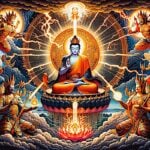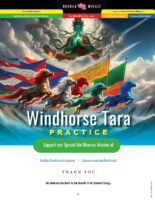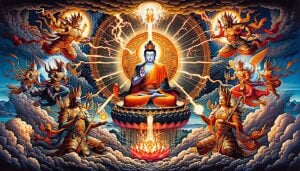Not Yours! “Whatever is not yours: let go of it.” — letting go of past, letting go of future: Na Tumhaka Sutta
One of the most popular short Suttas, often presented as a “must read” to new Buddhists is the famous “Not Yours” Sutta or what I like to call the “Letting Go” Sutta. Although Na Tumhaka Sutta is really a teaching on Dependent Arising, there’s are many ways — as always — to think of this teaching of Gautama Buddha. [For a full feature story on Dependent Arising see>>]
Today, the biggest issue I see in myself (and others) is the inability to “let go.” We can’t let go of the past. Those bad memories plague us, haunt us, never let us go. Those terrible tragedies — for me: both of my in-laws passing away after my own mother — they are so very hard to let go.
The Na Tumhaka Sutta teaches letting go in Shakyamuni Buddha’s own words. Although he speaks of ears, nose, tongue, body (after all, it’s a discourse on Dependent Arising and also letting go of attachments) when I read it I keep hearing: past, future, wants, fears. Of course, there are many suttas speaking to releasing attachment, and letting go of the past and staying in the present. Yet I return over and over to this short, wonderful sutta.
In a chaotic world, full of fears and dangers, the act of “letting go” is one of the most immediate and powerful methods to rise above the chaos. And reading the words of the Buddha, taking refuge in the Dharma, is the greatest of comforts.
Na Tumhaka Sutta
Not Yours
Translated from the Pali by Thanissaro Bhikkhu
“Whatever is not yours: let go of it. Your letting go of it will be for your long-term happiness and benefit. And what is not yours?
“The eye is not yours: let go of it. Your letting go of it will be for your long-term happiness and benefit. Forms are not yours… Eye-consciousness is not yours… Eye-contact is not yours… Whatever arises in dependence on eye-contact, experienced either as pleasure, as pain, or as neither-pleasure-nor-pain, that too is not yours: let go of it. Your letting go of it will be for your long-term happiness and benefit.
“The ear is not yours: let go of it…
“The nose is not yours: let go of it…
“The tongue is not yours: let go of it…
“The body is not yours: let go of it…
“The intellect is not yours: let go of it. Your letting go of it will be for your long-term happiness and benefit. Ideas are not yours… Intellect-consciousness is not yours… Intellect-contact is not yours… Whatever arises in dependence on intellect-contact, experienced either as pleasure, as pain, or as neither-pleasure-nor-pain, that too is not yours: let go of it. Your letting go of it will be for your long-term happiness and benefit.
“Suppose a person were to gather or burn or do as he likes with the grass, twigs, branches, and leaves here in Jeta’s Grove.
Would the thought occur to you, ‘It’s us that this person is gathering, burning, or doing with as he likes’?”
“No, lord. Why is that? Because those things are not our self nor do they pertain to our self.”
“In the same way, monks, the eye is not yours: let go of it. Your letting go of it will be for your long-term happiness and benefit… The ear… The nose… The tongue… The body… The intellect is not yours: let go of it. Your letting go of it will be for your long-term happiness and benefit… Whatever arises in dependence on intellect-contact, experienced either as pleasure, as pain, or as neither-pleasure-nor-pain, that too is not yours: let go of it. Your letting go of it will be for your long-term happiness and benefit.”
1 thought on “Not Yours! “Whatever is not yours: let go of it.” — letting go of past, letting go of future: Na Tumhaka Sutta”
Leave a Comment
More articles by this author

Profound simplicity of “Amituofo”: why Nianfo or Nembutsu is a deep, complete practice with innumerable benefits and cannot be dismissed as faith-based: w. full Amitabha Sutra

“Torches That Help Light My Path”: Thich Nhat Hanh’s Translation of the Sutra on the Eight Realizations of the Great Beings

Maha Mangala Sutta, Life’s Highest Blessings, The Sutra on Happiness, the Tathagata’s Teaching to Gods and Men

Miracles of Buddha: With the approach of Buddha’s 15 Days of Miracles, we celebrate 15 separate miracles of Buddha, starting with Ratana Sutta: Buddha purifies pestilence.
Search
Latest Features
Please support the "Spread the Dharma" mission as one of our heroic Dharma Supporting Members, or with a one-time donation.
Please Help Support the “Spread the Dharma” Mission!

Be a part of the noble mission as a supporting member or a patron, or a volunteer contributor of content.
The power of Dharma to help sentient beings, in part, lies in ensuring access to Buddha’s precious Dharma — the mission of Buddha Weekly. We can’t do it without you!
A non-profit association since 2007, Buddha Weekly published many feature articles, videos, and, podcasts. Please consider supporting the mission to preserve and “Spread the Dharma." Your support as either a patron or a supporting member helps defray the high costs of producing quality Dharma content. Thank you! Learn more here, or become one of our super karma heroes on Patreon.
Josephine Nolan
Author | Buddha Weekly
Josephine Nolan is an editor and contributing feature writer for several online publications, including EDI Weekly and Buddha Weekly.















With all that violence in the US today that started over the weekend and had been building up for a long time, and has happened before, I feel it is time for people on both sides of the fence to learn how to let go.